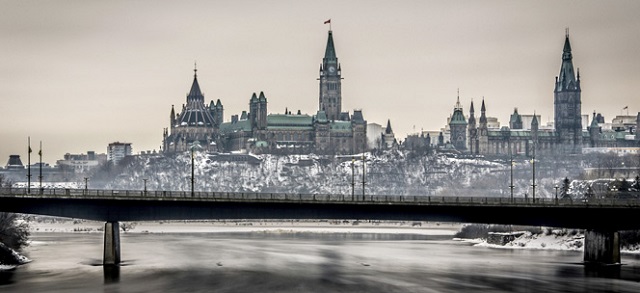Business
MP pay to increase between $8,000 and $16,000 in 2024

From the Canadian Taxpayers Federation
Author: Franco Terrazzano
The Canadian Taxpayers Federation estimates members of Parliament will take a 4.2 per cent pay raise on April 1.
“The federal government is more than $1 trillion in debt, taxpayers are struggling to afford basic necessities and MPs don’t deserve raises, so this is the perfect time to stop rubberstamping the pay raises politicians give themselves every year,” said Franco Terrazzano, CTF Federal Director. “MPs stopped pay raises in the past and they should stop this year’s pay raise.”
A backbench MP’s salary is currently $194,600. A minister collects $287,400, while the prime minister takes home a $389,200 annual salary.
MPs give themselves pay raises each year on April 1, based on the average annual increase in union contracts with corporations that have more than 500 employees.
While final pay numbers have not been released, contract data published by the government of Canada shows the average annual increase in the private sector was 4.2 per cent in 2023. Using this data, the CTF estimates this year’s pay raise will amount to an extra $8,100 for backbench MPs, $11,900 for ministers and $16,200 for Prime Minister Justin Trudeau.
After this year’s pay raise, backbench MPs will receive a $202,700 annual salary, according to CTF estimates. A minister will collect $299,300, while Trudeau will take home $405,400.
The federal government stopped automatic MP pay hikes from 2010 to 2013 in response to the 2008-09 recession.
“MPs should know better than to give themselves raises while their constituents are worried about rising mortgage payments and are struggling to feed their families,” Terrazzano said. “It’s not rocket science: MPs should do the right thing and stop their upcoming pay raise.”
| Position | Pre-pandemic salary | Current salary | Salary Apr.1 2024 (estimate) | Total increase since beginning of 2020 |
| MP |
$178,900 |
$194,600 |
$202,700 |
$23,800 |
| Minister |
$264,400 |
$287,400 |
$299,300 |
$34,900 |
| Prime Minister |
$357,800 |
$389,200 |
$405,400 |
$47,600 |
The average annual salary among all full-time workers is about $67,000, according to Statistics Canada.
Business
Largest fraud in US history? Independent Journalist visits numerous daycare centres with no children, revealing massive scam

A young journalist has uncovered perhaps the largest fraud scheme in US history.
He certainly isn’t a polished reporter with many years of experience, but 23 year old independent journalist Nick Shirley seems to be getting the job done. Shirley has released an incredible video which appears to outline fraud after fraud after fraud in what appears to be a massive taxpayer funded scheme involving up to $9 Billion Dollars.
In one day of traveling around Minneapolis-St. Paul, Shirley appears to uncover over $100 million in fraudulent operations.
🚨 Here is the full 42 minutes of my crew and I exposing Minnesota fraud, this might be my most important work yet. We uncovered over $110,000,000 in ONE day. Like it and share it around like wildfire! Its time to hold these corrupt politicians and fraudsters accountable
We ALL… pic.twitter.com/E3Penx2o7a
— Nick shirley (@nickshirleyy) December 26, 2025
Business
“Magnitude cannot be overstated”: Minnesota aid scam may reach $9 billion

Federal prosecutors say Minnesota’s exploding social-services fraud scandal may now rival nearly the entire economy of Somalia, with as much as $9 billion allegedly stolen from taxpayer-funded programs in what authorities describe as industrial-scale abuse that unfolded largely under the watch of Democrat Gov. Tim Walz. The staggering new estimate is almost nine times higher than the roughly $1 billion figure previously suspected and amounts to about half of the $18 billion in federal funds routed through Minnesota-run social-services programs since 2018, according to prosecutors. “The magnitude cannot be overstated,” First Assistant U.S. Attorney Joe Thompson said Thursday, stressing that investigators are still uncovering massive schemes. “This is not a handful of bad actors. It’s staggering, industrial-scale fraud. Every day we look under a rock and find another $50 million fraud operation.”
Authorities say the alleged theft went far beyond routine overbilling. Dozens of defendants — the vast majority tied to Minnesota’s Somali community — are accused of creating sham businesses and nonprofits that claimed to provide housing assistance, food aid, or health-care services that never existed, then billing state programs backed by federal dollars. Thompson said the opportunity became so lucrative it attracted what he called “fraud tourism,” with out-of-state operators traveling to Minnesota to cash in. Charges announced Thursday against six more people bring the total number of defendants to 92.
BREAKING: First Assistant U.S. Attorney Joe Thompson revealed that 14 state Medicaid programs have cost Minnesota $18 billion since 2018, including more than $3.5 billion in 2024 alone.
Thompson stated, "Now, I'm sure everyone is wondering how much of this $18 billion was… pic.twitter.com/hCNDBuCTYH
— FOX 9 (@FOX9) December 18, 2025
Among the newly charged are Anthony Waddell Jefferson, 37, and Lester Brown, 53, who prosecutors say traveled from Philadelphia to Minnesota after spotting what they believed was easy money in the state’s housing assistance system. The pair allegedly embedded themselves in shelters and affordable-housing networks to pose as legitimate providers, then recruited relatives and associates to fabricate client notes. Prosecutors say they submitted about $3.5 million in false claims to the state’s Housing Stability Services Program for roughly 230 supposed clients.
Other cases show how deeply the alleged fraud penetrated Minnesota’s health-care programs. Abdinajib Hassan Yussuf, 27, is accused of setting up a bogus autism therapy nonprofit that paid parents to enroll children regardless of diagnosis, then billed the state for services never delivered, netting roughly $6 million. Another defendant, Asha Farhan Hassan, 28, allegedly participated in a separate autism scheme that generated $14 million in fraudulent reimbursements, while also pocketing nearly $500,000 through the notorious Feeding Our Future food-aid scandal. “Roughly two dozen Feeding Our Future defendants were getting money from autism clinics,” Thompson said. “That’s how we learned about the autism fraud.”
The broader scandal began to unravel in 2022 when Feeding Our Future collapsed under federal investigation, but prosecutors say only in recent months has the true scope of the alleged theft come into focus. Investigators allege large sums were wired overseas or spent on luxury vehicles and other high-end purchases. The revelations have fueled political fallout in Minnesota and prompted renewed federal scrutiny of immigration-linked fraud as well as criticism of state oversight failures. Walz, who is seeking re-election in 2026 after serving as Kamala Harris’ running mate in 2024, defended his administration Thursday, saying, “We will not tolerate fraud, and we will continue to work with federal partners to ensure fraud is stopped and fraudsters are caught.” Prosecutors, however, made clear the investigation is far from finished — and warned the final tally could climb even higher.
-

 International19 hours ago
International19 hours agoOttawa is still dodging the China interference threat
-

 Business17 hours ago
Business17 hours agoThere’s No Bias at CBC News, You Say? Well, OK…
-

 Automotive16 hours ago
Automotive16 hours agoCanada’s EV gamble is starting to backfire
-

 International18 hours ago
International18 hours ago2025: The Year The Narrative Changed
-

 Fraser Institute2 days ago
Fraser Institute2 days agoCarney government sowing seeds for corruption in Ottawa
-

 Business1 day ago
Business1 day agoResidents in economically free states reap the rewards
-

 Alberta1 day ago
Alberta1 day agoAlberta project would be “the biggest carbon capture and storage project in the world”
-

 Alberta2 days ago
Alberta2 days agoAlberta Next Panel calls for less Ottawa—and it could pay off






